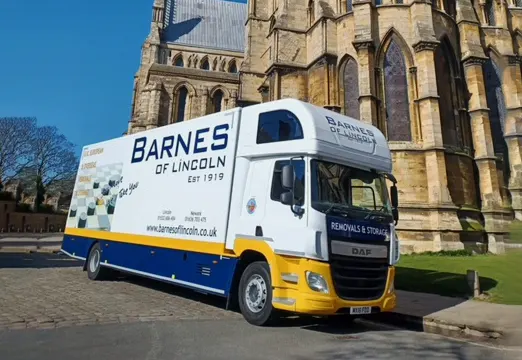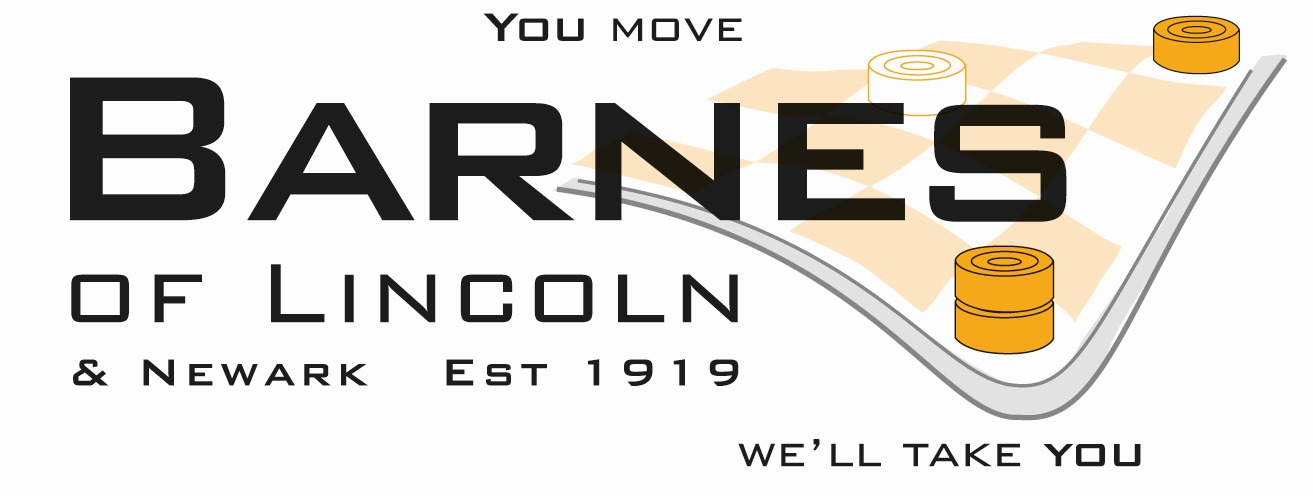Welcome to Barnes of Lincoln & Newark
Taking the stress out of moving home since 1919.
GOODTrustindex verifies that the original source of the review is Google. Great removals. Went the extra mile to accommodate us when dates changed at short notice. Cheerful guys on the jobTrustindex verifies that the original source of the review is Google. What more can I say other amazing wonderful hardworking young men I would recommend to anyone that was moving home. They take the stress & strain .so pleasant so polite . Well done Barnes on employing these amazing peopleTrustindex verifies that the original source of the review is Google. Barnes helped us move at the end of May and did an excellent job, I would recommend them I rang the office several times in the build up to our exchange and completion and Charlie in the office was always so helpful and friendly all the way through the process, a really nice person The guys were professional and worked hard on the day and were also patient in waiting for the keys to be handed over, they got a lot done in the time frame I’ve forgotten the guy’s name who did our bed and bunk bed but he did a great job too, even taking the time to make a change to the layout of the bunk bed to accommodate our son’s needsTrustindex verifies that the original source of the review is Google. We used Barnes of Lincoln last week for moving out of one family home into another. The lads who dealt with us had made us feel very relaxed on the day and wouldn't let us lift a finger! They took great care in loading and unloading our furniture and house items. Thank you Barnes, we will highly recommend your services to others! Tom & Holly HaddockTrustindex verifies that the original source of the review is Google. Barnes moved me last week,they were amazing,I was very stressed and they were so kind and helpful.They would not let me lift anything and made the day so much easier for me.I cannot praise them enough.Trustindex verifies that the original source of the review is Google. Barnes moved us from Lincoln into the Wolds. Awesome quick but caring service. Took the stress out of the completion day as well as helping the people further up the chain that had removals issues! The team were friendly and professional, they even brought in extra people that were in the area to get the job done quicker at both ends. Highly recommended firm thank you!
Get A Quick Form
A Lincoln Removals Company You Can Trust
With five generations of experience, Barnes of Lincoln provides trusted removals and storage solutions for homes and businesses. We handle your belongings with the utmost care, ensuring they arrive safely and securely, just as you left them.
At Barnes of Lincoln, we’re the removals company that gets it done! Whether you’re moving locally within Lincoln and Newark, across the UK, or internationally, we will handle your move with ease and expertise.
We work to your schedule, offering free quotes for home moves, office relocations, and part-load services. With flexible transport options – by road, sea container, or airfreight – we ensure your belongings reach their destination quickly and securely.
Contact us today for your removals quote. Our friendly team is ready to answer any questions and make your move as straightforward as possible.
Founded in 1919, our rich history is a true testament to our extensive experience in home removals. Over the years, we’ve perfected our skills, guaranteeing we provide a dependable service to every customer.
Barnes of Lincoln is here to support moves of all sizes. Whether you’re moving locally or across the UK, our dedicated Lincoln-based team ensures a seamless experience every step of the way. Our services ensure your move is stress-free.
Barnes of Lincoln offers customised European and international moving services to suit any budget and schedule. With decades of expertise and a trusted global network, we ensure your belongings arrive safely, letting you focus on other aspects of your move with confidence
At Barnes of Lincoln, we own all our vehicles, giving us unmatched flexibility and control, especially during busy seasons. With modern, secure storage facilities, we’re fully equipped to meet any moving need efficiently and confidently.
To get the most accurate price for your move we offer a free no-obligation survey.
Barnes of Lincoln Removals and Storage Services
Barnes of Lincoln is a trusted removals company committed to providing our customers with the best possible service and keeping your belongings safe.
We offer a range of professional services, including:
To provide the most accurate quote possible, we’ll arrange a free moving survey. Our surveyor will conduct a thorough assessment, determining the exact volume of your belongings. They’ll inspect each room in your home, carefully noting all items for transport to ensure an efficient and tailored moving plan and the most accurate quote for your move.
The team at Barnes of Lincoln is made up of professionally trained staff committed to providing a smooth, reliable moving experience. Each member is skilled in careful handling, packing, and transporting your belongings keeping them safe from start to finish. With extensive training and a focus on customer service, our staff are here to make your move as easy as possible.
Once your moving date is set, our team of experts can carefully pack your belongings using high-quality materials like breathable bubble wrap and double-lined cardboard boxes. These premium packing materials help protect your valuables at every stage of the move. Be sure to ask about our expert packing services for added peace of mind during the move.
Barnes of Lincoln provides tailored office relocation services to minimise downtime and keep your business running smoothly. Our trained team carefully handles everything from furniture to sensitive equipment, ensuring safe transport locally, nationally, or across the globe. With cost-effective packing solutions and efficient scheduling, we make your office move stress-free.
Barnes of Lincoln offer comprehensive overseas removal services, ensuring your belongings are transported safely and efficiently to destinations worldwide. Our skilled team handles every aspect of your move, from packing to delivery, providing peace of mind throughout the process. We also collaborate with trusted international partners to ensure secure transit and offer standard liability cover for your goods in transit.
Barnes of Lincoln offers secure and flexible storage solutions tailored to your needs. Whether short-term or long-term, our modern facilities ensure your items are safe, well-protected, and accessible. When you’re ready for your belongings to be delivered to your new location, we’re just a call away. Choose Barnes of Lincoln for storage options that seamlessly fit into your moving plans.
FAQs
While there isn’t a definitive answer, moving between Monday and Thursday is generally less expensive than weekends. Rates are often lower on weekdays when demand is lighter compared to weekends, as more people are available to move.
To get an accurate quote for your specific moving day, call us on 01522 254 262, and our team will gladly assist you.
Yes, we offer professional packing services. Barnes of Lincoln’s skilled team can expertly pack your items for any move, ensuring they’re securely packed in well-labeled boxes.
Our team is trained to handle your belongings with care, giving you peace of mind that everything will arrive safely at your new home.
Choosing the right removals company involves considering a few key factors.
First, check for accreditation; for example, members of the British Association of Removers (BAR) adhere to the highest industry standards, ensuring dependable service.
You’ll also want to review the services on offer, such as packing or storage, to ensure they meet all your needs.
Lastly, check customer reviews to get insight into other clients’ experiences, helping you understand the level of service you can expect.
Typically, payment is required by your moving date, which is standard for companies accredited by the BAR. This payment is covered by the BAR’s Advanced Payment Guarantee (APG), offering extra security for your move.
Tipping is entirely optional. While it’s appreciated, it’s not expected, and any amount should reflect what you feel is appropriate. Our team is committed to providing excellent service, whether or not a tip is given.
Yes, certain items cannot be moved due to safety reasons. These typically include flammable substances, lithium batteries, oil-based paints, and anything else that might endanger the load or vehicle.
If you’re unsure about a specific item, please don’t hesitate to ask us for clarification.
It’s recommended to book your move at least 4 to 6 weeks in advance. During the busy summer months, aim for 8 weeks or more. Early planning gives you time to prepare everything and ensures your preferred moving date is available.
One way to save on moving costs is to declutter before you pack. By reducing the volume of belongings, you’ll require fewer boxes, which can lower expenses. Plus, moving into a new space with less clutter can make settling in easier, especially if you’re downsizing.
Our Accreditation
Over the years we have worked hard to ensure that we provide each and every customer the best possible service. As part of this commitment to our customers, we have obtained accreditation from some of the industries most respected organisations. You can see some of our accreditations below:
Barnes of Lincoln is proud to be a member of the British Association of Removers (BAR). Our domestic moving services follow the BAR Code of Practice, ensuring we meet the highest industry standards through regular audits and a commitment to excellence.
Barnes of Lincoln adheres to the British Association of Removers’ Alternative Dispute Resolution Scheme, independently operated by the Furniture & Home Improvement Ombudsman.
T: 0333 241 3209 W: www.fhio.org





